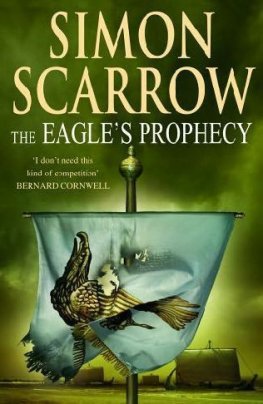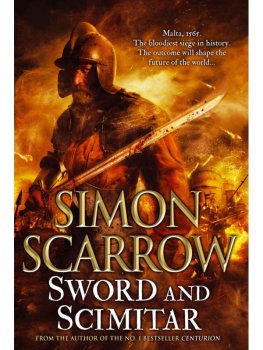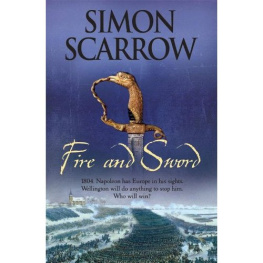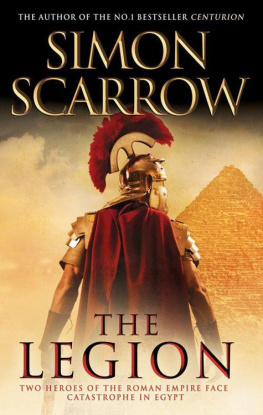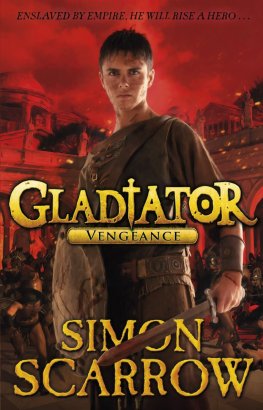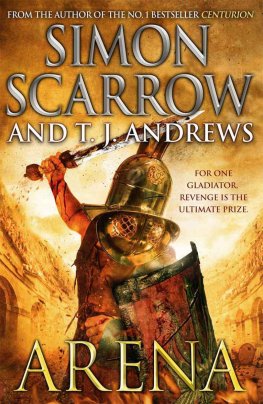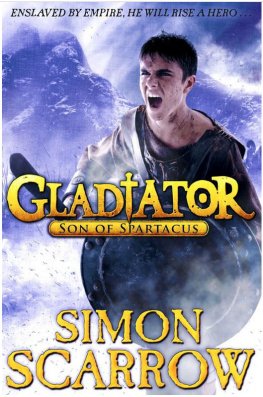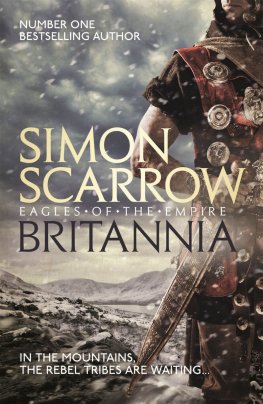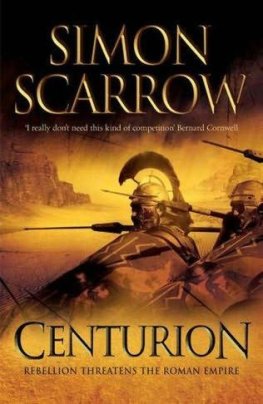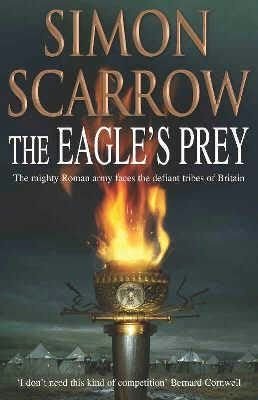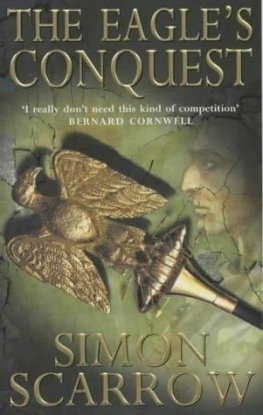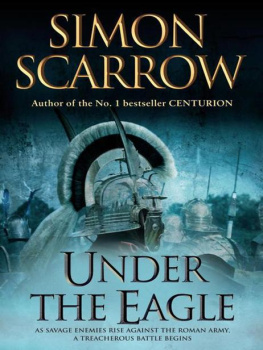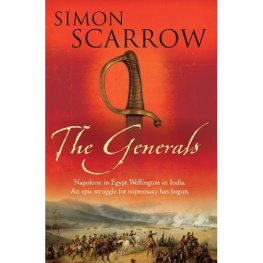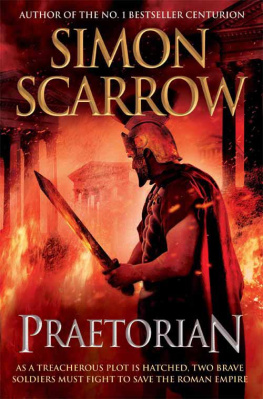Simon Scarrow - The Eagles Prophecy
Here you can read online Simon Scarrow - The Eagles Prophecy full text of the book (entire story) in english for free. Download pdf and epub, get meaning, cover and reviews about this ebook. genre: Adventure. Description of the work, (preface) as well as reviews are available. Best literature library LitArk.com created for fans of good reading and offers a wide selection of genres:
Romance novel
Science fiction
Adventure
Detective
Science
History
Home and family
Prose
Art
Politics
Computer
Non-fiction
Religion
Business
Children
Humor
Choose a favorite category and find really read worthwhile books. Enjoy immersion in the world of imagination, feel the emotions of the characters or learn something new for yourself, make an fascinating discovery.
- Book:The Eagles Prophecy
- Author:
- Genre:
- Rating:5 / 5
- Favourites:Add to favourites
- Your mark:
- 100
- 1
- 2
- 3
- 4
- 5
The Eagles Prophecy: summary, description and annotation
We offer to read an annotation, description, summary or preface (depends on what the author of the book "The Eagles Prophecy" wrote himself). If you haven't found the necessary information about the book — write in the comments, we will try to find it.
The Eagles Prophecy — read online for free the complete book (whole text) full work
Below is the text of the book, divided by pages. System saving the place of the last page read, allows you to conveniently read the book "The Eagles Prophecy" online for free, without having to search again every time where you left off. Put a bookmark, and you can go to the page where you finished reading at any time.
Font size:
Interval:
Bookmark:
Simon Scarrow
The Eagles Prophecy
CHAPTER ONE
The three ships lifted as the gentle swell passed beneath their keels. From the high steering deck of the merchantman, the port of Ravenna was visible for a moment before the vessels slumped down into the trough. The merchantman was caught between two sleek liburnians, secured in place by several boarding hooks tethered to stout posts on the ships on either side. The pirates aboard the liburnians had shipped their oars and hastily dropped their mainsails before swarming aboard the merchantman. The assault had been hard-fought and bloody.
Proof of the fury of the attackers lay scattered upon the deck: the broken bodies of sailors, sprawled across dark smears of blood on the smooth, well-worn planking. In amongst them lay the corpses of over twenty of the pirates, and from the steering deck the captain of the larger liburnian frowned as he looked down on the scene. They had lost too many men taking the ship. Usually, the howling wave of armed men pouring over the side unnerved their victims so much that they dropped their weapons and surrendered at once. Not this time.
The crew of the merchant ship, together with a handful of passengers, had met the pirates right at the ship's rail and held them off with a gritty determination that the pirate captain could not recall seeing before certainly not in the steady run of trading vessels he and his men had been preying on for the last few months. Armed with pikes, boathooks, belaying pins and a few swords, the defenders had held their ground as long as possible before they were forced back by superior numbers of better armed men.
Four of them in particular had drawn the pirate captain's eye: big, solid men in plain brown tunics, armed with short swords. They had fought to the end, back to back, around the base of the mast, and had killed a dozen pirates before they had been overwhelmed and cut down. The captain himself had killed the last of them, but not before the man had slashed open his thigh a flesh wound, now tightly bound up, but still throbbing with a painful intensity.
The pirate captain made his way down on to the main deck. He stopped by the mast and prodded one of the four men with his boot, rolling the body on to its back. The man had a soldier's build and bore several scars. Like the others. Perhaps that explained their skill with the sword. He rose to his feet, still looking down at the dead Roman. A legionary then, as were the man's companions.
The captain frowned. What were legionaries doing on the merchantman? And not just any legionaries: these were hand-picked men the best. Hardly casual passengers returning on leave from the east. No doubt they had organised and led the defence of the merchantman. And they had fought to the last drop of blood, with no thought of surrender. A shame, that, the captain reflected. He would have liked to offer them the chance to join his crews. Some men did. The rest were sold to slave-traders who asked no questions about the provenance of their property, and who were wise enough to ensure that the slaves were taken to market at the opposite end of the Empire. The legionaries would have been equally valuable as recruits or slaves, once their tongues had been cut out; a man would find it hard to complain about the injustice of his enslavement if he lacked a voice But the soldiers were dead. They had died purposelessly, the captain decided. Unless they had been sworn to protect something, or somebody
So what were they doing on the ship?
The pirate captain rubbed the dressing on his thigh and glanced round the deck. His men had thrown open the hatches of the cargo hold and were passing the more precious-looking pieces of cargo up on to the deck, where their comrades tore open the boxes and chests, scrabbling through the contents in search of valuables. More men were below decks, going through the possessions of the passengers, and dull thuds and splintering crashes sounded from beneath the planking.
The captain stepped over the bodies at the base of the mast and picked his way forward. Pressed into the bows were the survivors of the attack: a handful of sailors, mostly injured, and several passengers. They watched him warily as he approached. He nearly smiled as he saw one of the sailors trembling as he tried to edge away. The captain forced himself to keep his face devoid of expression. Below the dark, matted locks of his hair, piercing black eyes looked out from beneath a strong brow. His nose was broken and twisted, and knotted white scar tissue curved up across his chin, over his lips and up his cheek. His appearance had a wonderful effect on those that beheld him, but the injuries were not the marks of experience borne by a life-long pirate. Rather, they had been with him since childhood when his parents had dumped him as an infant in the slums of Piraeus, and he had long since forgotten the cause of his hideous scarring. The passengers and crew of the merchantman wilted before him as the pirate halted a sword's length away and ran his dark eyes over them.
'I am Telemachus, the leader of these pirates,' he said in Greek to the terrified sailors. 'Where is your captain?'
There came no reply, just the nervous breathing of men facing a cruel and imminent fate. The pirate captain's eyes never left them as his hand reached down and slowly drew his falcata.
'I asked for the captain-'
'Please, sir!' a voice interrupted. The pirate's gaze slid to the man who had been so desperate to back away from him. Now the sailor raised his arm and pointed a wavering finger along the deck.'The captain's over there He's deadI saw you kill him, sir.'
'Did you?' The pirate's thick lips curled into a smile. 'Which one?'
'There, sir. By the aft hatch. The fat one.'
The pirate captain looked over his shoulder and his eyes sought out the rotund body of a small man spread-eagled on the deck. Smaller by a head now. The latter was nowhere in sight, and Telemachus frowned a moment until he recalled an instant after he had jumped down on to the deck. Ahead of him a man, the merchantman's captain, had screamed and turned to run away. The glittering edge of the falcata had arced through the air, through the fleshy neck with barely a jolt, and the captain's head had leaped up and over the side.
'YesI remember.' The pirate's smile broadened into a contented grin. 'So who is the first mate?'
The sailor who had done all the speaking so far, half turned and nodded faintly at a large Nubian standing beside him.
'You?' The pirate gestured with the point of his blade.
The Nubian gave his shipmate a withering, contemptuous glance, before he nodded.
'Step forward.'
The first mate reluctantly advanced and looked warily at his captor. Telemachus was glad to see that the Nubian had the guts to meet his gaze. There was one man, at least, amongst the survivors. The pirate pointed back to the bodies around the foot of the mast.
'Those men the tough bastards who killed so many of my lads who were they?'
'Bodyguards, sir.'
'Bodyguards?'
The Nubian nodded. 'Came aboard in Rhodes.'
'I see. And who were they guarding?'
'A Roman, sir.'
Telemachus glanced over the shoulder of the Nubian at the other prisoners. 'Where is he?'
The Nubian shrugged. 'Don't know, sir. Haven't seen him since you boarded us. Might be dead. Might have gone over the side, sir.'
'Nubian' the captain leaned closer and spoke in an icy, menacing tone, 'I wasn't born yesterday. Show me this Roman, now, or I'll show you what your heart looks like Where is he?'
'Here,' a voice called out from the rear of the huddle of prisoners. A figure pushed himself forward, a tall lean man with the unmistakable features of his race: dark hair, olive skin and the long nose with which the Romans were prone to look down at the rest of the world. He wore a plain tunic, no doubt trying to pass himself off as one of the cheap fares who spent the entire journey on deck. But the man's vanity was irrepressible and an expensive ring still adorned the first finger on his right hand. The large ruby set into a gold band caught the captain's eye immediately.
Font size:
Interval:
Bookmark:
Similar books «The Eagles Prophecy»
Look at similar books to The Eagles Prophecy. We have selected literature similar in name and meaning in the hope of providing readers with more options to find new, interesting, not yet read works.
Discussion, reviews of the book The Eagles Prophecy and just readers' own opinions. Leave your comments, write what you think about the work, its meaning or the main characters. Specify what exactly you liked and what you didn't like, and why you think so.

